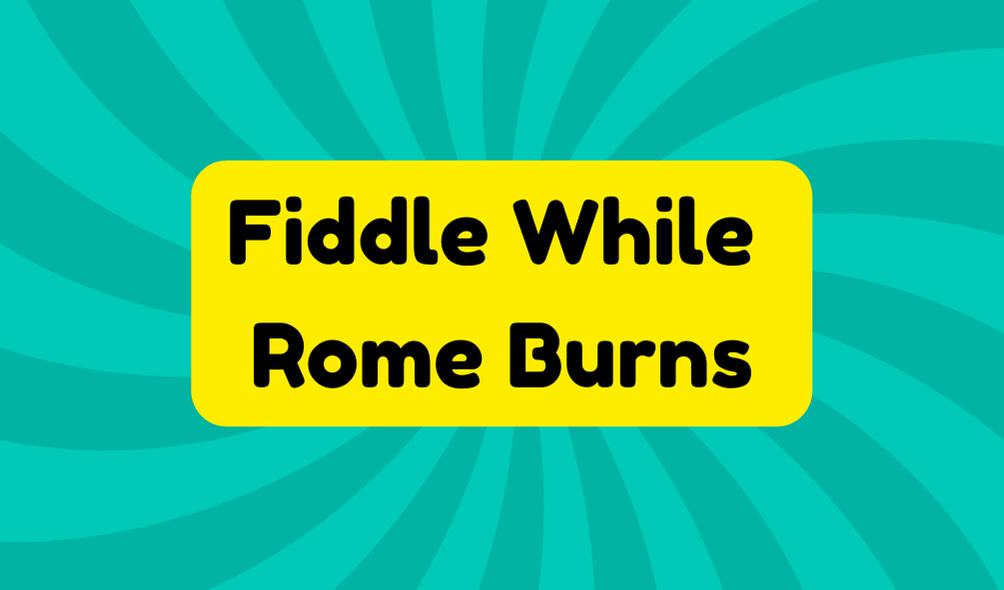The phrase "fiddle while Rome burns" refers to the troubling tendency of leaders and individuals to focus on trivial matters during urgent situations. It originates from Emperor Nero, who, according to rumor, played music while his city faced disaster. While historical accounts suggest he didn't actually fiddle, the idea emphasizes a disconnect between priorities and needs. Nowadays, we see this in leaders chasing minor issues while ignoring crises like climate change. It's critical to recognize these patterns and hold those in power accountable. You'll find that understanding this concept highlights the importance of addressing real challenges in today's world.
Synonyms
When discussing the concept of "fiddling while Rome burns," you might consider using synonyms that capture the essence of ignoring pressing issues for trivial pursuits. Such terminology resonates strongly in today's fast-paced world, where urgent crises demand your attention. Here are some alternatives that reflect this disconnect:
- Dawdling: Wasting time while significant problems arise.
- Dilly-dallying: Procrastinating on pressing matters.
- Frolicking: Playing around while issues escalate.
- Tinkering: Making minor adjustments while overlooking major concerns.
- Horseplay: Engaging in lighthearted activities during serious times.
These terms underscore how easy it is to get sidetracked by trivial pursuits when the need for action is critical. By using these synonyms, you challenge yourself and others to recognize when it's time to address real issues rather than indulging in distractions.
Example of Sentences
Understanding the concept of "fiddling while Rome burns" can be further illuminated by examining practical examples. In today's fast-paced world, it's easy to get caught up in trivial distractions when urgent crises demand our attention. Here are some prominent instances:
- A leader prioritizing photo ops over resolving a natural disaster.
- Employees engaging in social media banter while deadlines loom.
- Citizens debating minor policy changes during economic downturns.
- Companies focusing on branding while ignoring environmental concerns.
- Schools implementing trivial curriculum changes amidst safety issues.
These examples highlight how often we ignore pressing matters, opting instead for inconsequential pursuits. By recognizing these behaviors, you can better focus your energy on addressing the urgent crises that truly need your attention.
Origin
The idiom "fiddling while Rome burns" traces its roots back to a poignant moment in history involving Emperor Nero. While modern interpretations often glamorize Nero's myth of strumming a lyre amid the chaos of the Great Fire of Rome, historical accuracy exposes a different reality. The fiddle, a popular instrument, didn't even exist in Nero's time. Instead, this tale expresses how people often engage in musical distractions while crises unfold around them. It questions the priorities of those in power, showing a disconnect between urgent needs and trivial pursuits. By understanding this origin, you can appreciate why this phrase remains relevant today, echoing the consequences of neglect in the face of significant challenges.
Collocations
Engaging in discussions about collocations related to "fiddling while Rome burns" can deepen your understanding of its application in varied contexts. You'll recognize that language shapes perception, particularly when it comes to crisis management. Here are key collocations you should consider:
- Ignore significant issues
- Pursue trivial pursuits
- Prioritize inconsequential activities
- Amidst a crisis
- Address urgent needs
These phrases emphasize the disconnection between necessary action and the focus on less important tasks. When leaders engage in trivial pursuits during significant crises, it showcases a troubling tendency to neglect responsibilities. This idiom serves as a reminder of the need for accountability in addressing urgent situations, pushing us toward a more effective response rather than becoming distracted by the frivolous.
How to Use in Everyday Language
It is crucial to recognize when you're "fiddling while Rome burns" in your daily life, especially during pressing situations. Take stock of your actions—are you getting caught up in trivial matters while important tasks go unattended? Everyday examples include scrolling through social media instead of tackling that looming project or bickering about minor issues at work while major deadlines approach. Practical applications of this awareness involve redirecting your focus when crises arise. Prioritize urgent matters over distractions. When you sense you're avoiding responsibilities, pause and assess your priorities. Engage actively in resolving significant challenges, rather than wasting time on inconsequential tasks. By being mindful, you empower yourself to confront real issues before they spiral out of control.
Why Is It Still Relevant Today?
In today's fast-paced world, many individuals and leaders find themselves caught up in superficial pursuits while significant issues demand urgent attention. This saying, "fiddle while Rome burns," serves as a stark warning against government negligence and poor crisis management. You might notice leaders focusing on trivial matters when pressing crises like climate change or public health emergencies arise. This disconnect illustrates a concerning trend where innovation takes a back seat. As citizens, it's essential to hold our leaders accountable, pushing them to prioritize urgent issues rather than engaging in distractions. Recognizing the relevance of this idiom today encourages us to advocate for responsible leadership that actively addresses critical problems instead of just fiddling while Rome smolders.







